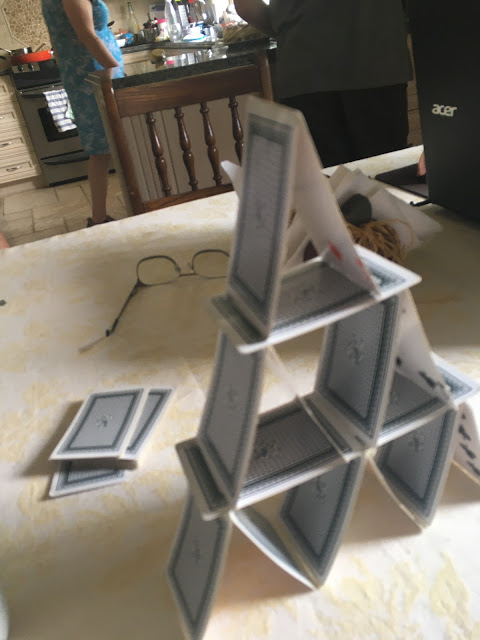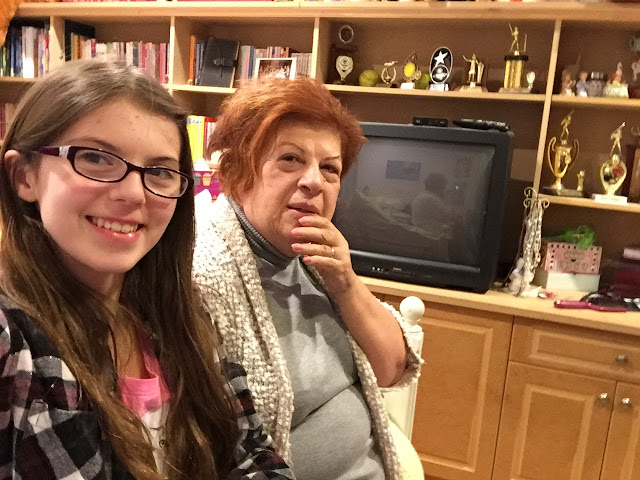House of Cards: A Series
Diabetes is very complicated.
I mean like, diabetes as a disease is realistically pretty simple if you ignore the fact that we don't know exactly what causes it - immune system attack on beta cells = no beta cells = no insulin = type one diabetic - but managing type one while also:
- working/completing school
- trying to have a healthy lifestyle (exercising and sleeping enough)
- managing family relationships and friendships and possibly a relationship with a significant other
- participating in extracurricular activities
- having quiet time to relax and take care of yourself
can be quite difficult and overwhelming! These other important things must be scheduled around type one, and even when they are, type one can easily disrupt them. School, relationships, and mental health are supposed to be priorities. And usually, they are. In normal circumstances. But if type one decides it's going to start causing problems, it needs to be prioritized, and that can be really hard to do. A few examples of this:
Going low or high while trying to focus on school or work is problematic, because you have to stop what you're doing and treat your number, even if what you're working on is really important or if you only have a certain amount of time to get it done. It's frustrating and makes time management more difficult and unpredictable.
Exercise is a whole ordeal. You have to eat a small snack before you exercise so you don't go low. You have to pay attention to how you're feeling when you're exercising to ensure you don't miss a low. You have to stop midway through exercising to treat lows. Depending on what kind of exercise you're doing and how long you're exercising for, you could go low soon after exercising or high later in the day, or in the middle of the night. Sleep is an ordeal, too. You have to get up multiple times in the middle of the night to check your number to make sure you don't go low in your sleep and to give yourself the best probability of waking up in the morning.
Other things like relationships and leisure activities and making time for yourself are difficult to schedule around diabetes things. Your blood sugar won't consider that your little sibling wants to go for a bike ride with you before it goes low. Your insulin pump site change won't reschedule itself just because you have a playoff soccer game that you really don't want to have to leave midway through. Diabetes won't go away just because you want to take a night off to watch old movies and not think about responsibilities.
So yeah, managing diabetes while also having a life is an acquired skill that takes time to perfect and will always be challenging. There are so many factors at play at any given time, things that you can control (your insulin settings, your schedule, what you eat, how you treat highs and lows, whether you use an insulin pump or a continuous glucose monitor, how often you exercise) and things you can't control (your emotions, your energy levels, your mental health, your physical health). With all of those things constantly up in the air, managing diabetes well can feel like you're trying to build a house of cards.
Card houses are unstable. They shake and wobble and fall down. They take time and concentration to build. It is stressful to try building one. And one little shake of the table can bring everything crashing down. Managing life with type one is very unpredictable. It's hard and time-consuming, it takes a lot of dedication and concentration, and it is insanely stressful and sometimes terrifying.
Similar situations, no? I mean, one is legitimately a stack of cards while the other one is a life, so there are for sure major differences, but for the sake of metaphors, I have come to the conclusion that there are similarities. So what am I saying?
(*pauses to think for a few seconds*)
My main point is this: What makes a successful house of cards? What makes a successful house or structure of any kind? A strong base. A good support system. Not adding too much weight without having the strength to hold it. Being careful not to shake the table.
Could the same philosophies apply to managing type one? What would a base look like in the context of type one? A good support system? Being careful adding extra weight? Not shaking tables? What does that even mean? Well, it will mean something different to everyone who lives with or is affected by type one diabetes.
I know what these things mean to me, and I know how they have helped me to manage my condition better and to live a healthier, safer, and freer life, so I thought I'd share them with the world (or more precisely the people who have stumbled upon this blog by happy accident or because I asked you to read it - thank you, by the way, Mother 😉) in a bit of a series! Actually, the first series I've ever really done! It will consist of five posts (this one being the first) that go into detail about things like diabetes technology, getting involved in diabetes advocacy (SHOUT-OUT TO JDRF Canada!!), asking questions and finding answers, and being okay with where you are in your personal journey.
Also, just for fun, click here for a quick tutorial (not mine, found it on YouTube and it seems pretty straightforward and easy-to-follow, I take no credit for it) on how to build a house of cards!
Hope everyone is doing okay and taking care of themselves during this time of struggle! This is really hard, and you're doing great! See you soon with Part 2 of House of Cards: A Series!
You can do this, Type 1 Warriors!





Effective analogy. Looking forward to reading the rest of the series!
ReplyDelete